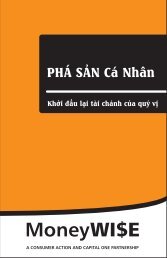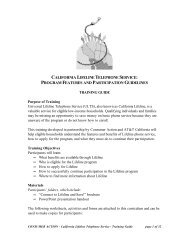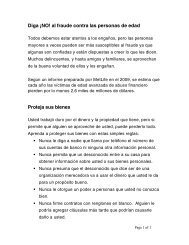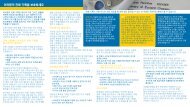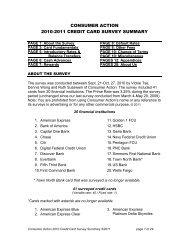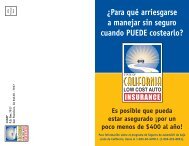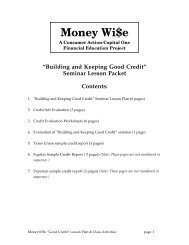Talking to Teens about Money - Seminar Lesson ... - Consumer Action
Talking to Teens about Money - Seminar Lesson ... - Consumer Action
Talking to Teens about Money - Seminar Lesson ... - Consumer Action
Create successful ePaper yourself
Turn your PDF publications into a flip-book with our unique Google optimized e-Paper software.
A <strong>Money</strong>Wi$e TrainingHere are some important points <strong>about</strong> credit unions:• A credit union is a non-profit cooperative financial institution owned andcontrolled by its members, while a bank is a for-profit company that makesmoney from charging fees and lending money.• Credit unions serve groups that share something in common, such as theirprofession, place of worship or neighborhood.• Credit unions provide checking and savings accounts and loans, often at betterrates than commercial banks.TIP: To find a credit union that you can join, call the Credit Union NationalAssociation at 800-358-5710, or visit its web site (www.cuna.org).The advantages <strong>to</strong> having a bank or credit union account:• Your money is safe from loss, theft or fire.• Each account is insured up <strong>to</strong> $100,000 by the Federal Deposit InsuranceCorporation (banks) or the National Credit Union Share Insurance Fund (creditunions).• Canceled checks are proof that you paid a bill.• Using check-cashing s<strong>to</strong>res and money orders is more expensive than payingbank fees.• A bank account can help you keep track of how you spend your money.Key points <strong>about</strong> checking accounts for youth:• Checking and savings accounts are great ways <strong>to</strong> help young people learn <strong>to</strong>manage money.• By teaching your kids <strong>to</strong> manage a checking account, you can also pave theway <strong>to</strong> good financial habits such as careful money management, paying bills ontime and handling credit cards well.• A bank account—savings or checking—is handy for cashing paychecks.• Writing checks is a safe alternative <strong>to</strong> carrying cash.• An ATM or debit card, which comes with many checking accounts, can serveas “training wheels” for using credit cards.• Most youth accounts are “cus<strong>to</strong>dial”—an adult must open the account onbehalf of the minor and the adult is responsible for the account.Questions <strong>to</strong> generate discussion:• What should you look for when comparing accounts?—Look for “free” youth accounts with no minimum balance requirement ormonthly service fees and unlimited check writing with no per-check fees.—Special accounts for youth usually require a low minimum balance ($1 <strong>to</strong> $5).—Some banks offer a slightly higher interest rate for youth accounts.• What are some ways <strong>to</strong> help your teen find a bank account?—In many communities there are banks and credit unions offering specialaccounts for young people.—Suggest that your teenager call some banks listed in the Yellow Pages andcompare accounts they offer, or compare accounts online.“<strong>Talking</strong> <strong>to</strong> <strong>Teens</strong> About <strong>Money</strong>” — <strong>Money</strong>Wi$e <strong>Lesson</strong> Plan Page 10 of 27


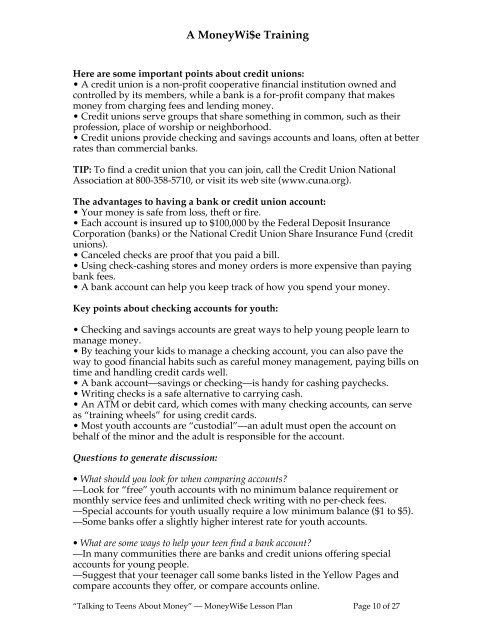
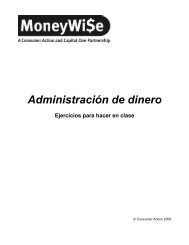

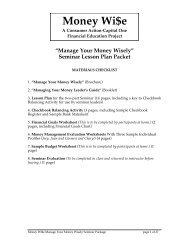
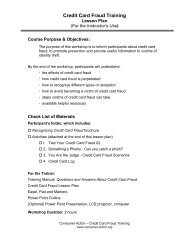
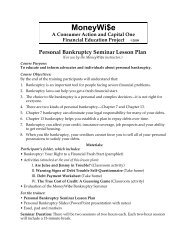
![Debt Collection Issue [Winter 2007-2008] - Consumer Action](https://img.yumpu.com/43405069/1/169x260/debt-collection-issue-winter-2007-2008-consumer-action.jpg?quality=85)
